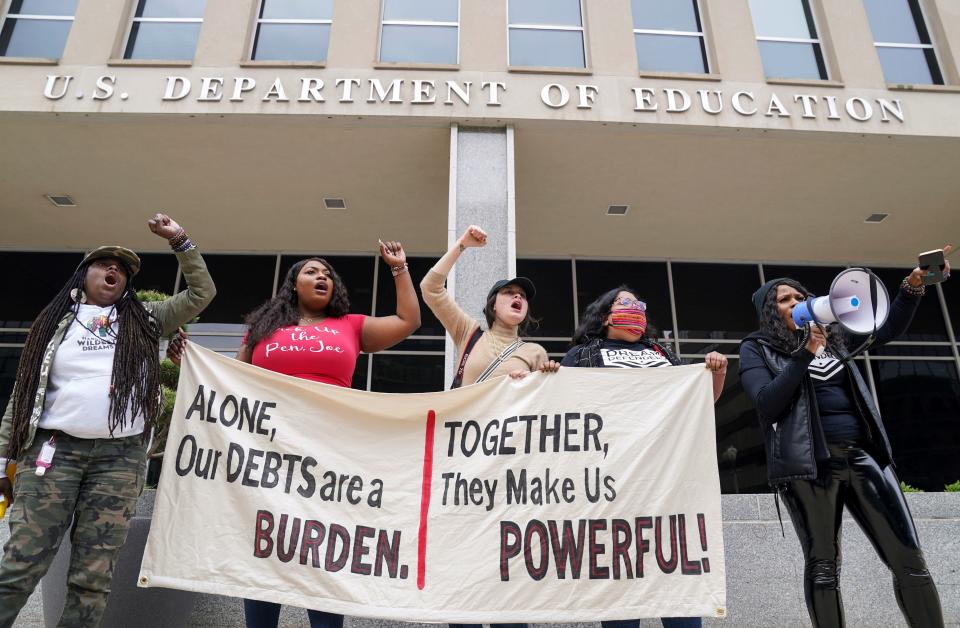Professor: Biden's didn't start student loan fire, but his forgiveness could make it hotter
David McClough is associate professor of economics at Ohio Northern University's James F. Dicke College of Business Administration.
If it were not entirely predictable, one might say that the first 15 months or so of the Biden administration have been underwhelming or disappointing.
I can’t imagine who could have expected anything more.
More: Letters: Republicans must divest party from 'toxic, hate-fueled rhetoric' stoked by Trump
To be clear, President Joe Biden is not personally responsible for the highest inflation in over a generation. He is not responsible for Vladimir Putin’s invasion of Ukraine, and he is not responsible for the mutations of COVID-19.
Much like all presidents, he took office at a bad time and has been on defense from day one. That we expect anything else seems naïve.
Grasping for any sort of traction with voters, the administration continues to grapple with the idea of student debt forgiveness.
More: J.D. Vance: 'I will be damned' if Ukraine prioritized over 'tsunami of illegal migrants'
Unlike the “welcome basket” that awaited him as he moved into the White House; if the president eludes the legislative process and instead employs an executive order to forgive student debt, he will be personally responsible for the consequences.

Indeed, he will worsen a legacy that already includes permitting genocide in a country the U.S. promised to protect, mishandling a pandemic, and advocating inflation-fighting tactics that exacerbate inflation.
Much like promoting home ownership by removing the “barriers” to homeownership, debt forgiveness is “good” politics.
The proposal is intended to make the president and the Democrats, appear sensitive and in tune with the challenges facing the electorate. The message resonates with voters because people think they are getting something for nothing.

Rather than exploring intergenerational injustice and the blatant political opportunism motivating the proposal, I will explain how forgiving student debt will increase tuition and accelerate accumulation of student debt.
Having demonstrated why debt forgiveness is a terrible idea, I will offer suggestions that address the problem.
To begin, forgiving debt alters the price of attending college but not in the way that the President and his political handlers peddle to voters.
More: Ohio State University trustees approve 4.6% tuition increases for incoming freshmen
Expecting debt forgiveness, parents and students will now be willing to borrow more. Quite simply, debt forgiveness increases demand for college. More demand tends to translate into higher prices.
Accordingly, debt forgiveness translates into higher tuition, room and board, books, etc.
When the federal government started subsidizing college education, the demand for college increased and tuition outpaced inflation for decades contributing mightily to the student debt situation that the forgiveness scheme pretends to address.
Readers hesitant to embrace this line of reasoning might recall that cheap credit fueled real estate prices leading to a bubble that burst in spectacular fashion less than two decades ago, so it should be no surprise that free credit will fuel the cost of attending college.
The only question is when will we experience the spectacular burst? As heard on late-night television, But that’s not all. There’s more!
A more nefarious implication of debt forgiveness will amplify the negative consequences. Parents and students expecting debt forgiveness will be less inclined to evaluate the value proposition of prospective colleges. In addition, borrowers will be less inclined to seek out scholarships and grants.
No one will observe these subtle behavioral effects, but one can be certain of an aggregative effect that will increase borrowing to pay higher costs and to cover the absence of scholarships and grants.
The term “moral hazard” refers to changes in behavior due to removing some risk. The classic example is motorcycle helmets. Bikers, on average, are less careful when wearing helmets. One can only imagine how much less dangerous football would be without the pads and helmets. Head-to-head contact would likely collapse like the NASDAQ.
All told, debt forgiveness alters the price and incentives of the market for higher education. Politicians are notoriously self-serving and voters are shortsighted. The solution is to eliminate government involvement from financing higher education.
Reducing government involvement will put downward pressure of prices and motivate students to seek scholarships and grants to offset costs. Students would leave college with less debt, which would liberate them to pursue employment consistent with their interests and abilities.
More: Opinion: Republicans 'lured' one-issue voters with abortion outrage. What is next target?
In the end, the monetary value of a college education is determined by the vibrancy of the economy and the demand for college educated workers.
Rather than continue to pound away at misinformed policy measures that burden future generations, the administration would be well-advised to embrace policy initiatives that contribute to a robust economy and a dynamic labor market that offers individuals opportunity to realize their potential while meeting their material needs.
David McClough is associate professor of economics at Ohio Northern University's James F. Dicke College of Business Administration.
This article originally appeared on The Columbus Dispatch: Opinion: What impact would student loan forgiveness have on price?

